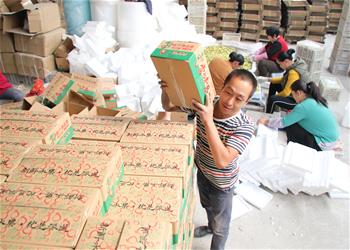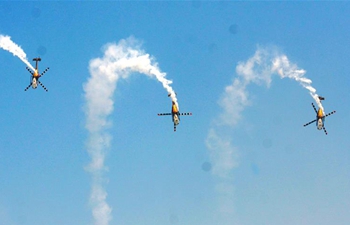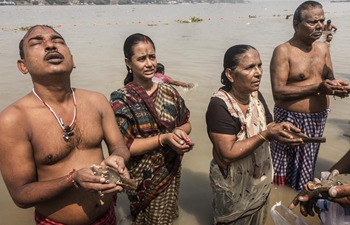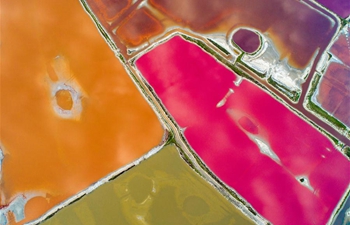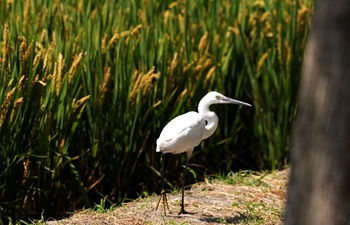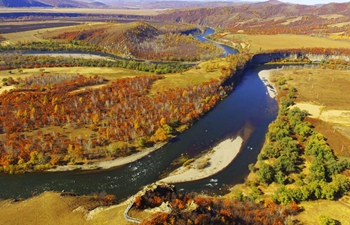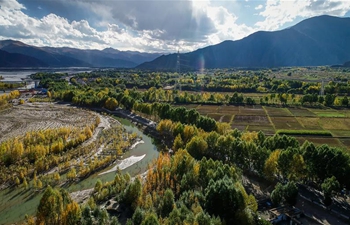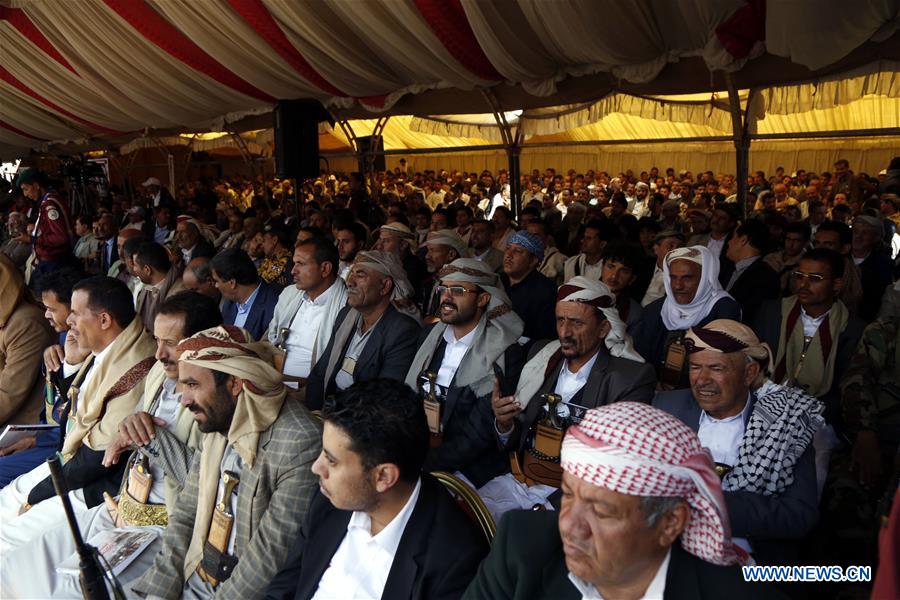 ?
?People attend a commemoration for the victims on the second anniversary of a 2016 funeral hall airstrike in Sanaa, Yemen, on Oct. 8, 2018. (Xinhua/Mohammed Mohammed)
by Mohamed al-Azaki
SANAA, Oct. 8 (Xinhua) -- Remains of missiles and ash are still in the place, as hundreds of children who lost their fathers in one of the most deadliest airstrikes through Yemen's three-year war gathered Monday in the capital Sanaa to commemorate their parents on the second anniversary of a 2016 funeral hall airstrike.
The children and relatives gathered in a large crowd near the wreckage of the giant funeral hall in the southern part of Sanaa to watch the scene, to recall final memories with their parents who were among 140 civilians killed here by that air attack that also injured over 500 others.
The children sat next to each other along with their young widowed mothers on ranks of chairs under a very long tent that cast its shadow across the opposite side of the wreckage of the funeral hall building.
Some carried red roses, white flowers, while the others held posters showing their dads and uncles. Most of the children are still too young to remember details of the terrible tragedy.
"I bought a red rose for my dad," Hashim Radhwan al-Khazan, a 12-year-old boy who lost his father in the airstrike, told Xinhua.
His brother, five-year-old Ahmed, repeated "red rose...I love you dad."
Their 15-year-old sister, Huda, could not tell much besides tears mixed with words. "I will never forget my father," she sobbed.
The young widowed mother said the "airstrike killed her husband Radhwan into pieces."
Radhwan was among nearly 1,000 civilians packed in the hall on Oct. 8, 2016 to mourn the death of the father of a rebel official who was then close to the then Houthi-allied former President Ali Abdullah Saleh.
"Radhwan was all our lives, he said goodbye to me and kissed his three children before leaving our house to the funeral hall," the 33-year-old mother, Sameerah, recalled.
Saudi-led coalition blamed the Yemeni internationally recognized government for the mistaken funeral hall airstrike, as the Yemeni government allegedly provided wrong information.
The United Nations strongly condemned the airstrike. Many foreign countries promised to halt weapons sales to the states of the Arab coalition forces.
The Yemeni conflict escalated in September 2014 after the Houthi rebels, who are allied with Iran, seized control of the capital Sanaa and much of the country's north.
Saudi Arabia led a mostly Arab coalition forces to roll back Houthis and reinstate the government of exiled President Abd-Rabbu Mansour Hadi.
In the next chair, 11-year-old Haytham Ahmed al-Arashi sat beside his older brother Abdulelah, 21 years old, rising a large picture of their father killed here by the airstrike.
"We were at home then and two hours after my dad left home, we heard very big shocking news ... Few hours later, we were informed that our father was killed in the airstrike ... My mom fell sick and got mentally ill," Abdulelah said.
"His death ruined our whole lives and badly affected us," he lamented.
Reacting to his older brother, Haytham said "my dad has gone to the heaven."
Mohammed, a 31-year-old man who is a cousin of Abdulelah and Haytham, was accompanying his uncle Ahmed on that day to the funeral hall.
"I went with my uncle Ahmed to mourn al-Ruwayshan's family in this hall," Mohammed recalled as rising his prosthesis left arm pointing to the funeral hall five meters away in front of the commemoration tent.
"We arrived early at noon and shooke hands with the family members of al-Ruwayshan," Mohammed recalled. "After a while, we were about to leave the hall ... at the gate, we heard the big screaming sound of a jet and then a bombing with big pressure... shrapnel ... fire ... intensified black smoke ... everything turned upside down," he remembered.
"I stood again and found my hand and arm on the ground ... Everyone was screaming and crying ... My uncle was lying on a pool of blood ... He shouted to me ... go go run to the hospital and save your life," Mohammed recalled.
"I picked up my hand and arm while blood flooded from my right side and ran.. After I was a few steps from the hall, a second strike hit the tent," Mohammed, who is now wearing his new fitted prosthesis that replaced his missing left arm and hand in the strike, told Xinhua.
Mohammed was among over 500 others who were lucky enough to survive the two airstrikes that claimed the lives of 140 others on the spot after the funeral of one man became a slaughter of many.




